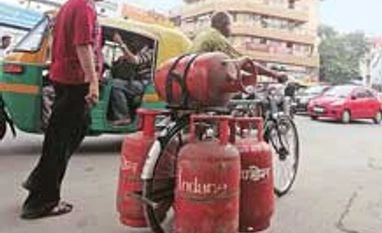This is in addition to savings from the elimination of duplicate or fake connections as a result of implementation of the direct benefit transfer for LPG (DBTL) scheme — Rs 14,600 crore in FY15 — and additional savings of around Rs 2,000 crore through the GiveitUp campaign under which 5.7 million consumers have voluntarily surrendered their subsidy so far.
| STEP ON THE GAS |
|
“According to our estimates, there are two million consumers in the Rs 10 lakh-plus slab (of taxable income). Some of these are already covered under GiveitUp. We are estimating savings of roughly Rs 300 crore per annum,” said a senior oil ministry official.
The calculation is based on annual usage of eight cylinders per household at the current level of subsidy of Rs 189 per cylinder. The official added the ministry is busy working out modalities to implement the plan.
According to ratings agency Icra, the savings in LPG subsidies for the government could be up to Rs 500 crore, if subsidy is blocked for high-income households with a consumption of 1.25-1.5 times the average. “However, there could be significant overlaps between the population set of income above Rs 10 lakh and the set of 5.75 million consumers who have already given up subsidy voluntarily under GiveItUp,” Icra said in a statement.
It added, while the quantum of subsidy savings is minuscule compared to the overall LPG under-recovery in the recent past, this could be a step in the right direction and the subsidy could decrease significantly once the taxable income slab for availing LPG subsidy is reduced progressively. “Further, benefits of such a step would be more visible over the medium-term in a scenario of rise in crude oil prices as the subsidy savings level would be materially higher in case crude oil prices increase from the current low level of $35 per barrel.”
The oil ministry on Monday announced the decision to stop LPG subsidy for consumers with taxable income of above Rs 10 lakh. The new guideline will come into effect “on self-declaration basis” from January 2016.
India currently has 163.5 million LPG consumers. LPG subsidy is transferred directly into the bank accounts of 147.8 million consumers. Households are currently entitled to 12 cylinders of 14.2 kg each at the subsidised rate of Rs 419.26, while the market price is Rs 608 for a cylinder. At the current level of per-cylinder subsidy of Rs 189, most of the well-off consumers will have to sacrifice gains of Rs 2,268 a year, assuming full utilisation of the cap of 12 cylinders per household.
The latest step by the Bharatiya Janata Party-led government seeks to consolidate a series of efforts to rein in petroleum subsidies — diesel price deregulation in October 2014, nationwide rollout of the DBTL scheme from January 2015 and Prime Minister Narendra Modi’s call to the citizens in March 2015 to voluntarily surrender LPG subsidies under GiveitUp.



)